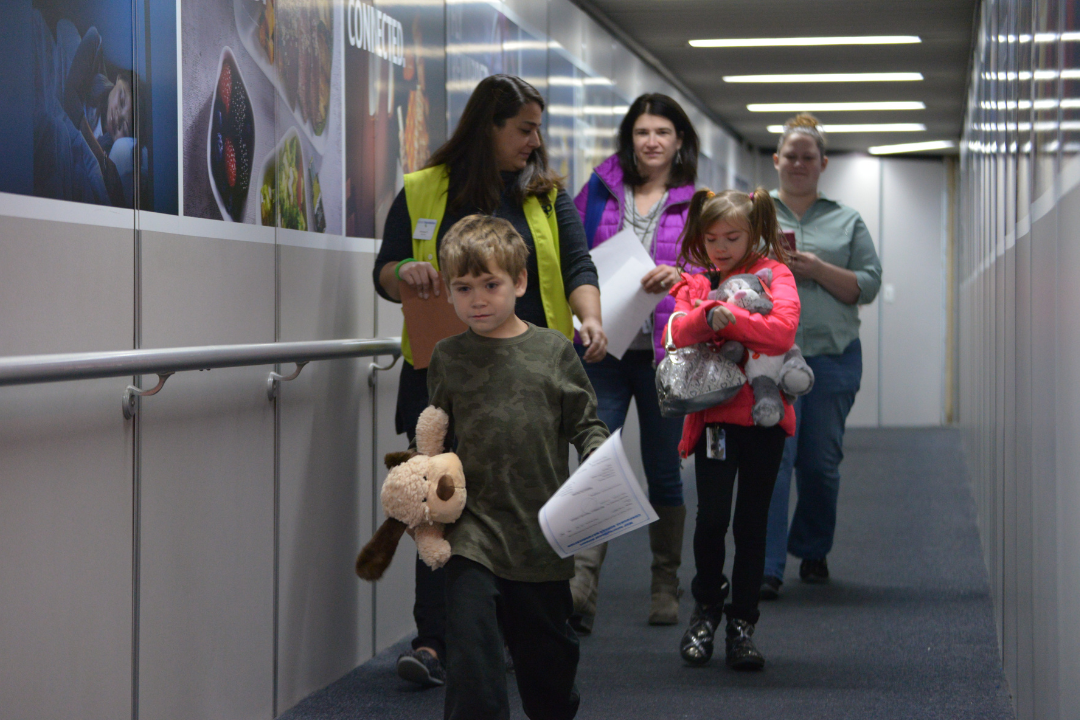Supporting Travelers with Autism: AuSM’s Role in the Navigating MSP Program

For over a decade, AuSM has proudly partnered with the Minneapolis-St. Paul International Airport (MSP) to support the Navigating MSP program. This initiative, a collaboration with the Metropolitan Airports Commission and Fraser, offers travelers with autism and other disabilities an opportunity to take free practice runs through the airport. From the moment you enter the airport to the final steps of reaching your gate, the journey can be overwhelming for anyone. For individuals with autism, this experience can be even more daunting. By familiarizing participants with TSA security screening, exploring the terminal, and even boarding a plane to meet a pilot, the program helps reduce anxiety and create a more positive travel experience.
Each month, our staff works with the Navigating MSP volunteers to guide participants through the process. Whether we are supporting a traveler one-on-one or entertaining their siblings so families can focus on their autistic loved one, the goal is always to make the airport experience more manageable and less stressful. Two recent interactions from 2024 exemplify the impact of this support.
Helping a Teen Traveler Find Calm and Confidence
During a recent session, an AuSM staff member noticed a teenage boy who seemed to need additional support. As the staff member approached them, they were met with smiles and interest, but also recognized that the boy’s actions were dysregulated—alternating between sweet and friendly moments and periods of uncertainty, overwhelm, and defensiveness. With the added layer that the family spoke Spanish as a primary language, AuSM’s staff member dusted off some old language skills and jumped in, quickly assessing that his repeated request for lunch indicated an unmet need that could impact his ability to fully participate in the program. Thanks to many summers at AuSM Camps, the staff remembered an old trick: chewy food or candy can activate the same response that is triggered by the weight and pressure of a weighted blanket, or a deep squeeze. (The jaw is a powerful muscle after all, and one that produces a calming response when engaged in deep and heavy chewing.) She grabbed some candy from a nearby kiosk and shared it with the teen.
Sitting together by the terminal window, they munched on Starbursts while watching planes take off, allowing the teen to slowly relax. As his anxiety decreased, he verbalized his biggest concern: the fear that the flight would hurt his ears. His mother and the AuSM staff were then able to address his fears and provide reassurance. With newfound confidence, the teen and his family continued the program successfully, culminating in an exciting boarding experience. This interaction not only provided immediate support but also introduced the family to AuSM’s growing Spanish-language resources, reinforcing the organization’s dedication to inclusivity. The family was preparing for an international trip over the New Year, and thanks to Navigating MSP, they felt more prepared for their upcoming journey to visit their extended family.
Guiding a Young Child Through Flight Anxiety
Another meaningful experience involved a young child who successfully navigated the terminal, but found the overwhelming noise, unfamiliar faces, and strong smells on the plane were simply too much to handle. AuSM staff knew that the most important tool here was patience; they stepped in with plenty of reassurance that it was safe and people were there to help. Staff gently guided the child through the process, showing them step-by-step what to expect, until they felt confident enough to step forward and board the plane.
The anxiety wasn’t fully gone though, and the child spent time entering and exiting the plane: AuSM staff quickly turned it into a game until they found the child loved watching TV. They pulled up cartoons on a screen inside the plane, and with the addition of familiar, comforting activity, the plane became a safe place. As the tour came to a close, the child was so relaxed that they lay down and continued watching TV on their own, without any need for further support. They had gained a sense of trust in both the environment and the people around them.